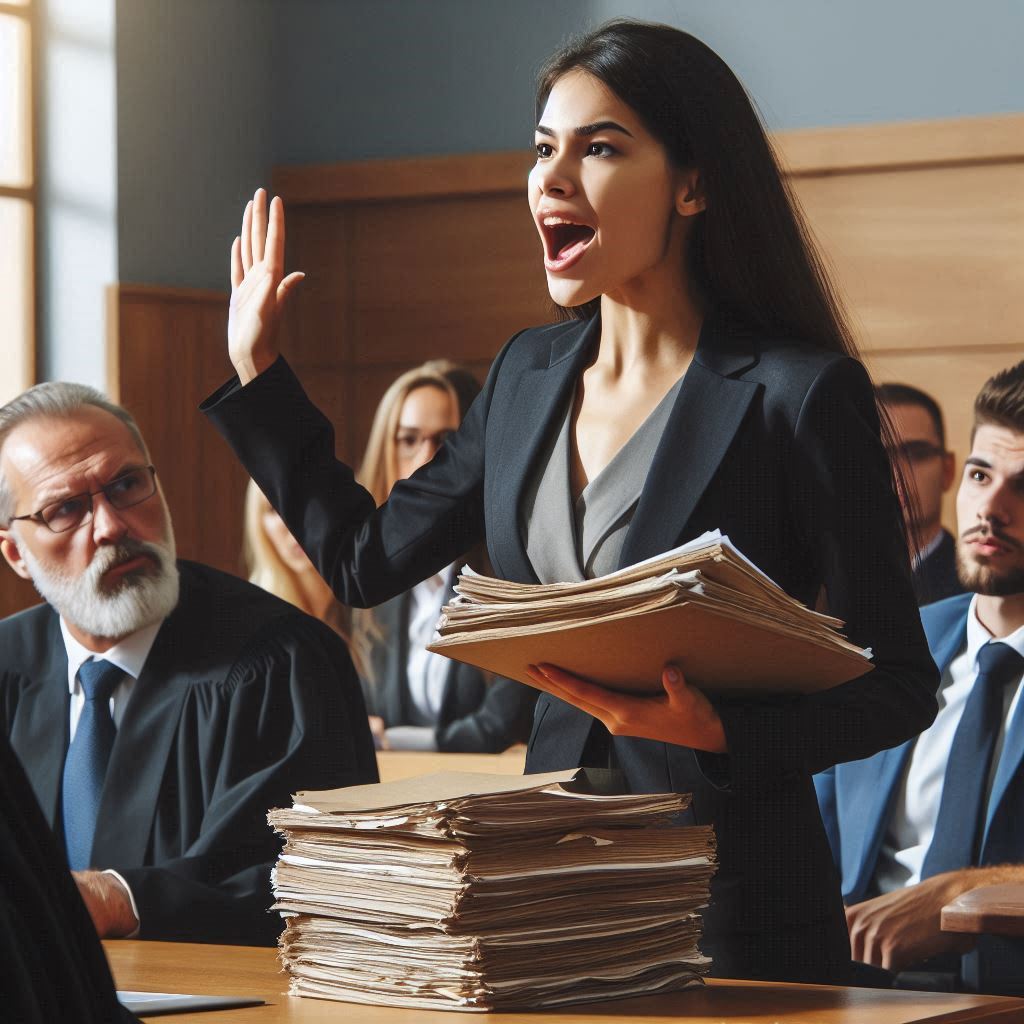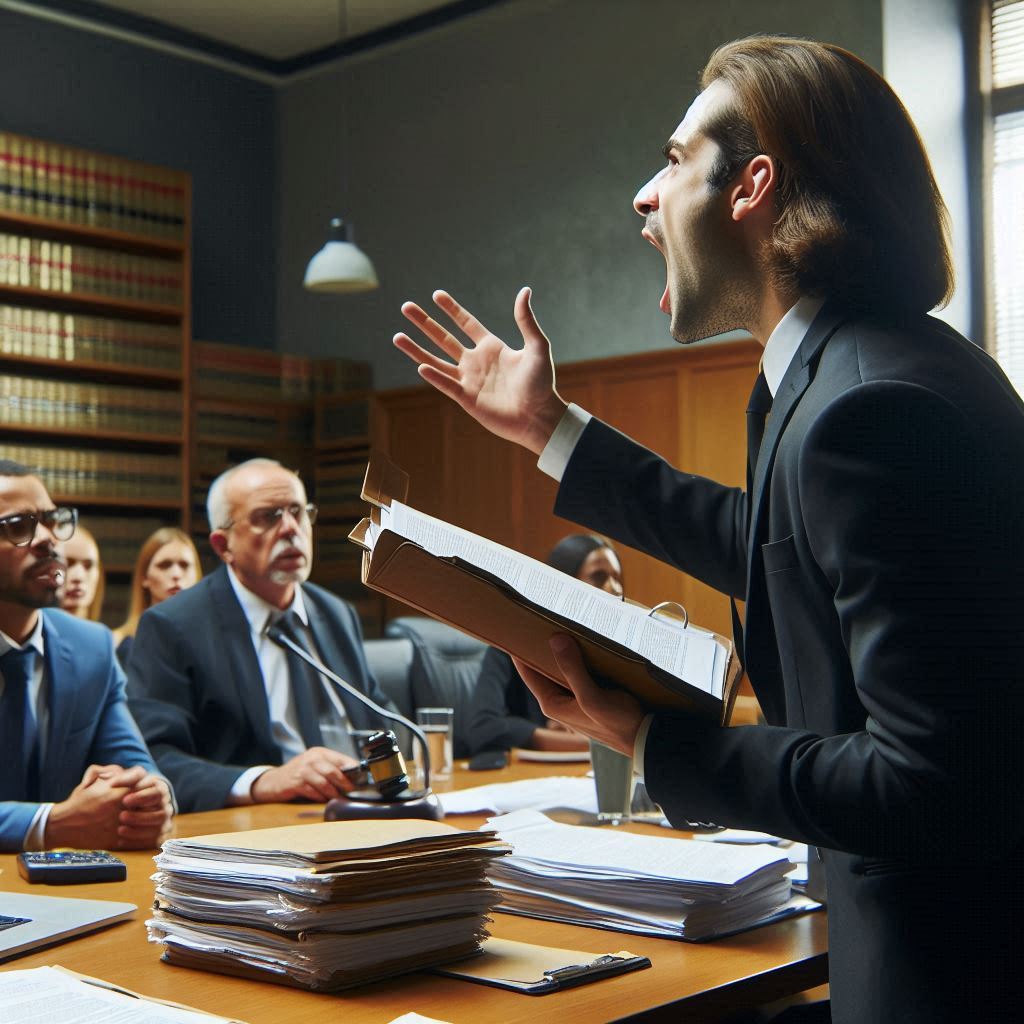Introduction
The role of a prosecutor is pivotal in the criminal justice system, requiring a unique set of skills and qualities.
These attributes not only define a prosecutor’s effectiveness but also shape their ability to uphold justice and ensure fairness in legal proceedings.
Prosecutors play a critical role in presenting the case against defendants, aiming to secure convictions that align with the law.
Their success hinges not only on legal expertise but also on a range of interpersonal and analytical skills.
A successful prosecutor must possess keen analytical abilities to evaluate evidence, assess legal precedent, and anticipate defense strategies.
Analytical prowess allows prosecutors to construct compelling arguments that withstand scrutiny in court.
Comprehensive understanding of criminal law and procedure is fundamental.
Prosecutors must interpret complex legal statutes and case law, applying them effectively to build robust cases and argue persuasively before judges and juries.
Effective communication is essential for prosecutors to articulate their arguments clearly and persuasively.
They must present evidence, question witnesses, and address the court with confidence, ensuring their case is comprehensible and compelling.
Integrity is non-negotiable for prosecutors, who must uphold the highest ethical standards.
They must adhere strictly to legal guidelines, avoid misconduct, and prioritize fairness in pursuit of justice.
Prosecutors often negotiate plea deals to expedite justice and allocate judicial resources efficiently.
Negotiation skills enable them to reach agreements that serve the public interest while respecting the rights of defendants.
Emotional intelligence helps prosecutors navigate sensitive and high-pressure situations effectively.
Understanding and managing emotions, both their own and those of others involved in the legal process, fosters empathy and professionalism.
Time Management
Prosecutors handle multiple cases simultaneously, requiring exceptional time management skills.
Prioritizing tasks, meeting deadlines, and managing caseloads efficiently are crucial for maintaining courtroom effectiveness.
The legal landscape can be unpredictable, demanding resilience and adaptability from prosecutors.
They must navigate setbacks, adapt strategies, and maintain focus amid challenges to achieve successful outcomes.
Basically, the skills and qualities essential for a successful prosecutor are multifaceted and demanding.
By cultivating analytical acumen, legal expertise, communication proficiency, ethical integrity, negotiation finesse, emotional intelligence, time management, resilience, and adaptability, prosecutors can excel in their roles.
These attributes not only contribute to individual success but also uphold the integrity and effectiveness of the criminal justice system.
Education and Background
Educational Requirements For Becoming A Prosecutor (Law Degree)
To embark on a career as a prosecutor, a law degree is essential.
This foundational education provides a comprehensive understanding of legal principles and courtroom procedures.
A strong legal background serves as a bedrock, offering insights into criminal law intricacies and the judicial system.
Beyond formal education, specialized training in areas like trial advocacy or criminal procedure can enhance prosecutorial skills, ensuring proficiency in handling complex cases.
Understanding legal nuances is crucial for prosecutors, necessitating continuous learning and adaptation to evolving laws.
Practical experience gained through internships or clerkships in district attorney offices or similar settings provides firsthand exposure to courtroom dynamics.
This practical exposure is invaluable, honing skills in evidence presentation, case analysis, and legal argumentation.
Importance of a Strong Legal Background
Prosecutors rely heavily on their legal acumen to uphold justice effectively.
A robust legal background instills confidence in handling diverse legal challenges and ethical dilemmas.
It equips prosecutors with the ability to assess evidence critically, make sound decisions, and advocate for victims and the community.
Moreover, familiarity with criminal statutes and procedural rules enables prosecutors to navigate the complexities of the legal system with precision and integrity.
This expertise is fundamental in ensuring fair trials and securing convictions based on substantial evidence.
Additional Certifications and Specialized Training
Beyond academic credentials, prosecutors benefit from specialized certifications or training programs tailored to their jurisdiction’s legal requirements.
Courses in forensic science, courtroom ethics, or advanced trial techniques can broaden their skill set and enhance credibility in the courtroom.
Certifications like board certification in criminal law show commitment to professional growth and expertise in prosecution specialties through ongoing legal education participation.
These credentials bolster prosecutors’ qualifications, positioning them as competent advocates for justice.
Generally, aspiring prosecutors should prioritize acquiring a solid legal education complemented by practical experience and specialized training.
This holistic approach not only meets the educational prerequisites but also equips them with the essential skills and qualities needed to excel in the demanding role of a prosecutor.
By continually refining their legal expertise and staying abreast of legal developments, prosecutors uphold the integrity of the judicial process and contribute to the pursuit of justice in their communities.
Read: Impact of High-Profile Cases on Prosecutors’ Careers
Analytical Skills
Importance Of Strong Analytical Skills In The Field Of Prosecution
In the realm of prosecution, analytical skills stand as a cornerstone.
These skills are pivotal for prosecutors who navigate the complexities of legal cases and evidence.
Let’s delve into why analytical prowess is crucial and how it shapes a prosecutor’s ability to build compelling cases.
Analytical skills are vital in prosecution due to their role in dissecting legal nuances.
Prosecutors must scrutinize case details, from witness testimonies to forensic evidence.
This keen analysis allows them to uncover crucial facts and potential discrepancies that can sway case outcomes.
Navigating Complex Legal Cases
In the field of prosecution, cases often present intricate legal landscapes.
Here, analytical skills enable prosecutors to break down complex laws and precedents.
By understanding these intricacies, they can strategically plan their legal approach and anticipate defense strategies.
Examples of Analytical Skills in Action
Consider a homicide case
A prosecutor must meticulously analyze crime scene evidence, witness statements, and forensic reports.
Through this analytical process, they can construct a cohesive narrative that aligns with legal standards.
Similarly, in financial crime cases, such as embezzlement, prosecutors rely on detailed financial analysis to trace funds and demonstrate illegal activities.
Analytical skills empower prosecutors to connect dots effectively.
For instance, in a fraud case involving digital evidence, prosecutors analyze electronic trails to establish timelines and motives.
This methodical approach strengthens their argument and enhances courtroom credibility.
In a nutshell, analytical skills are not merely advantageous but essential for prosecutors.
They enable thorough examination of legal complexities, empowering prosecutors to construct compelling cases.
By honing these skills, prosecutors can navigate diverse legal scenarios with confidence, ensuring justice is served effectively.
Read: Prosecutor Salaries: What to Expect in This Career
Communication Skills
Communication Skills are crucial for a successful prosecutor as they play a key role in the legal profession. Here are some points to emphasize:
Why Communication Skills are Important
- Clear communication ensures the prosecutor can effectively convey their arguments in court.
- It helps in building a strong case by presenting evidence and facts concisely.
- Being able to communicate effectively with juries, judges, and other legal professionals is essential.
Effective Communication with Juries, Judges, and Legal Professionals
- Prosecutors need to adapt their communication style to suit different audiences.
- They must simplify complex legal jargon to ensure everyone understands the case.
- Listening skills are equally important to understand the perspectives of others.
The Importance of Persuasive Communication
- Prosecutors must be able to persuade the jury of the defendant’s guilt beyond a reasonable doubt.
- Using compelling arguments and evidence, prosecutors can sway the judge’s decision in their favor.
- Strong communication skills help in negotiating plea deals and settlements effectively.
In essence, communication skills are the foundation of a successful prosecutor’s career, enabling them to advocate for justice effectively in the courtroom.
Read: How to Prepare for a Career as a Prosecutor

Attention to Detail
- Attention to detail is crucial in prosecuting cases successfully because it ensures that nothing is overlooked.
- Carefully reviewing evidence, legal documents, and case details can make or break a case.
- Overlooking small details can have a significant impact on the outcome of a case.
How Attention To Detail Is Crucial In Prosecuting Cases Successfully
Prosecutors must pay close attention to every aspect of a case to build a strong argument in court.
Here are some reasons why attention to detail is essential for a successful prosecutor:
- Accuracy in collecting and presenting evidence: Prosecutors must meticulously gather and organize evidence to support their case. Missing even a small piece of evidence can weaken their argument and jeopardize the case.
- Thorough review of legal documents: Legal documents such as police reports, witness statements, and court filings contain critical information that can make or break a case. A prosecutor must carefully review these documents to identify any inconsistencies or gaps in the case.
- Understanding case details: Every detail in a case can play a significant role in the final verdict. By paying attention to even the smallest details, a prosecutor can uncover crucial information that can sway the outcome of the case.
How Overlooking Small Details Can Impact The Outcome Of A Case.
When a prosecutor overlooks small details, it can have severe consequences for the case.
For example, missing a key piece of evidence or failing to thoroughly review a legal document can lead to a wrongful conviction.
In contrast, paying attention to detail can uncover inconsistencies in witness statements or highlight important facts that strengthen the case.
Ultimately, attention to detail is a fundamental skill for a successful prosecutor.
It allows them to build a strong case, present compelling arguments in court, and secure justice for victims.
By meticulously reviewing evidence, legal documents, and case details, prosecutors can significantly increase their chances of achieving a successful outcome in court.
Read: Challenges Faced by Public Defenders Daily
Integrity and Ethics
They both form the bedrock of a successful prosecutor’s career.
Integrity is not merely a virtue but a cornerstone in the realm of law and justice.
How Prosecutors Need To Uphold Ethical Standards And Abide By The Law
Prosecutors, entrusted with upholding the law, must embody unwavering integrity in their actions and decisions.
This trait ensures that justice is pursued with fairness and impartiality, regardless of the case’s nature or complexity.
In the field of prosecution, ethical standards are paramount.
Prosecutors are held to high ethical standards, requiring them to navigate legal complexities with a clear moral compass.
They must adhere to legal codes and professional guidelines meticulously.
This adherence not only strengthens their cases but also ensures that justice is served transparently.
Significance of maintaining trust and credibility with the public and legal community
Maintaining trust and credibility is fundamental for prosecutors.
The public and legal community rely on prosecutors to uphold justice with honesty and diligence.
By consistently demonstrating ethical behavior, prosecutors bolster public trust in the judicial system.
Credibility, once established, enhances a prosecutor’s ability to effectively advocate for justice and navigate legal challenges.
In practice, prosecutors face ethical dilemmas that demand sound judgment and adherence to ethical principles.
Upholding integrity requires making decisions that prioritize justice over personal gain or public opinion.
By remaining steadfast in ethical conduct, prosecutors safeguard the integrity of their profession and contribute to a just society.
Prosecutors play a pivotal role in the legal system, where every decision impacts individuals, communities, and the administration of justice.
Integrity and ethics empower prosecutors to navigate the complexities of their profession with fairness and accountability.
This commitment not only ensures the pursuit of justice but also reinforces public confidence in the legal process.
In review, integrity and ethics are indispensable qualities for prosecutors striving for excellence in their profession.
Upholding these principles not only defines their character but also shapes the outcomes of legal proceedings.
By prioritizing integrity and ethical conduct, prosecutors uphold the fundamental principles of justice and earn the respect of their peers and the public alike.
Trial Experience
The value of trial experience for a successful prosecutor
Trial experience is like a teacher in the courtroom.
It allows prosecutors to learn the rules of the game firsthand.
They can witness the dynamics between the prosecution, defense, judge, jury, and witnesses.
This experience helps prosecutors understand how to present evidence effectively, examine witnesses, and argue their case persuasively.
It also teaches them how to think on their feet, respond to unexpected developments, and navigate the complexities of the legal system.
Transform Your Career Today
Unlock a personalized career strategy that drives real results. Get tailored advice and a roadmap designed just for you.
Start NowHow experience in the courtroom can improve prosecutorial skills
Every trial presents a learning opportunity for prosecutors.
They can hone their communication skills, critical thinking, and ability to analyze evidence.
Experience helps prosecutors develop a strategic mindset and anticipate the defense’s tactics.
It also teaches them how to build strong cases, craft compelling narratives, and deliver persuasive arguments.
In the heat of a trial, experience is what separates a good prosecutor from a great one.
Importance of learning from past trials to enhance future performance
Reflection is a key aspect of trial experience.
Prosecutors must analyze their performance after each trial to identify strengths and weaknesses.
By learning from past trials, prosecutors can refine their strategies, tactics, and techniques.
They can also adapt and improve based on feedback from judges, colleagues, and mentors.
Continuous learning and growth are essential for prosecutors to stay sharp, effective, and successful in their careers.
Conflict Resolution Skills
How Conflict Resolution Skills Play A Vital Role In Prosecuting Cases
Conflict resolution skills are crucial for prosecutors in handling cases effectively.
By being able to resolve conflicts, prosecutors can navigate through challenging situations that may arise during the prosecution process.
Here are some key points to consider:
- Prosecutors need to navigate conflicts with opposing counsel to reach agreements and negotiate terms.
- Conflicts with witnesses may arise, requiring prosecutors to address any issues and maintain credibility.
- Handling conflicts with other parties involved, such as law enforcement or victims, is essential for a successful prosecution.
Importance of Conflict Resolution Skills
Effective conflict resolution can lead to successful case resolutions by promoting collaboration and problem-solving.
By addressing conflicts promptly and professionally, prosecutors can maintain the integrity of the case and ensure a fair trial for all parties involved.
Examples Of How Effective Conflict Resolution Can Lead To Successful Case Resolutions
Here are some examples
- Successful negotiation with defense counsel can result in plea bargains and expedited case resolutions.
- Resolving conflicts with witnesses can lead to obtaining crucial evidence and testimony for the case.
- Managing conflicts with law enforcement can help in building strong relationships and securing cooperation.
In closing, conflict resolution skills are essential for prosecutors to effectively prosecute cases and achieve successful outcomes.
By being able to navigate conflicts with various parties involved, prosecutors can ensure that justice is served and uphold the rule of law.
Conclusion
To excel as a prosecutor, several key skills and qualities are indispensable.
A successful prosecutor must possess strong analytical abilities.
They must be adept at evaluating evidence and building compelling cases.
Effective communication skills are crucial.
Prosecutors must articulate complex legal arguments clearly and persuasively.
Additionally, they need excellent interpersonal skills.
Building rapport with witnesses, victims, and law enforcement is essential for gathering accurate information and fostering cooperation.
Furthermore, a successful prosecutor exhibits resilience and determination.
They must handle high-pressure situations and setbacks with grace.
Adaptability is also vital.
Legal landscapes can change rapidly, requiring prosecutors to adjust strategies and tactics accordingly.
Time management skills are crucial in balancing caseloads and court appearances effectively.
A successful prosecutor is highly organized, ensuring no detail is overlooked in preparing cases.
Ethical integrity forms the cornerstone of prosecutorial work.
Prosecutors must uphold the law impartially, maintaining public trust and confidence.
Leadership qualities are advantageous.
Prosecutors often lead teams of legal professionals, requiring the ability to inspire and motivate others toward common goals.
Finally, a commitment to ongoing learning and professional development is essential.
Staying updated on legal precedents and evolving statutes ensures prosecutors remain effective in their roles.
In fact, developing and honing these skills and qualities is crucial for aspiring prosecutors.
Mastery of analytical, communication, and interpersonal skills lays the foundation for success.
Resilience, adaptability, and ethical integrity are fundamental in navigating the complexities of prosecutorial work.
Effective time management and organizational skills ensure efficiency in handling cases.
Leadership and a commitment to continuous learning further distinguish exceptional prosecutors.
Final note
Aspiring prosecutors should focus on cultivating these attributes throughout their education and early career experiences.
Each skill contributes significantly to prosecutorial effectiveness and contributes to a successful legal career.
By prioritizing the development of these qualities, aspiring prosecutors can position themselves for impactful contributions to the justice system.
In summary, aspiring prosecutors should embrace the journey of skill development.
By fostering these essential attributes, they not only enhance their professional capabilities but also contribute positively to the pursuit of justice.
The path to becoming a successful prosecutor begins with a dedication to mastering these skills, ensuring readiness to face the challenges and responsibilities of the role.




